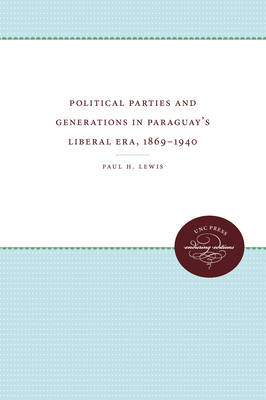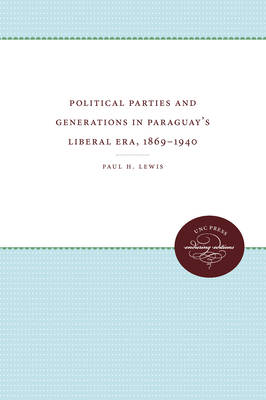
- Afhalen na 1 uur in een winkel met voorraad
- Gratis thuislevering in België vanaf € 30
- Ruim aanbod met 7 miljoen producten
- Afhalen na 1 uur in een winkel met voorraad
- Gratis thuislevering in België vanaf € 30
- Ruim aanbod met 7 miljoen producten
Zoeken
Political Parties and Generations in Paraguay's Liberal Era, 1869-1940
Paul H Lewis
Paperback | Engels
€ 72,95
+ 145 punten
Omschrijving
From a North American perspective, the turbulence that dominated Paraguayan politics during the Liberal Era appears so pervasive as to approach anarchy. But in this seemingly haphazard succession of administrations, political machines, and governmental systems, Paul Lewis sees a pattern of evolution. His astute examination of political institutionalization employs the concept of political generations to explain Paraguayan conflict and change while analyzing a significant but understudied period of Paraguayan history. Lewis chronicles the growth of the two major Paraguayan parties, the Liberals and the Colorados, from their early days as political clubs through periods of personalist caudillo politics, national machine politics, and finally institutionalized party politics. Arguing that coalitions formed along generational lines and then held power until a new--and often younger--group pushed them aside, he ties the rise and fall of party fortunes to generational change. Lewis constructs a multistage theory of political party development that makes sense not only of Paraguay's Liberal Era but also of political turmoil in many Latin American states.
Originally published in 1993.
A UNC Press Enduring Edition -- UNC Press Enduring Editions use the latest in digital technology to make available again books from our distinguished backlist that were previously out of print. These editions are published unaltered from the original, and are presented in affordable paperback formats, bringing readers both historical and cultural value.
Originally published in 1993.
A UNC Press Enduring Edition -- UNC Press Enduring Editions use the latest in digital technology to make available again books from our distinguished backlist that were previously out of print. These editions are published unaltered from the original, and are presented in affordable paperback formats, bringing readers both historical and cultural value.
Specificaties
Betrokkenen
- Auteur(s):
- Uitgeverij:
Inhoud
- Aantal bladzijden:
- 248
- Taal:
- Engels
Eigenschappen
- Productcode (EAN):
- 9780807857083
- Verschijningsdatum:
- 6/01/2011
- Uitvoering:
- Paperback
- Formaat:
- Trade paperback (VS)
- Afmetingen:
- 156 mm x 234 mm
- Gewicht:
- 381 g

Alleen bij Standaard Boekhandel
+ 145 punten op je klantenkaart van Standaard Boekhandel
Beoordelingen
We publiceren alleen reviews die voldoen aan de voorwaarden voor reviews. Bekijk onze voorwaarden voor reviews.











